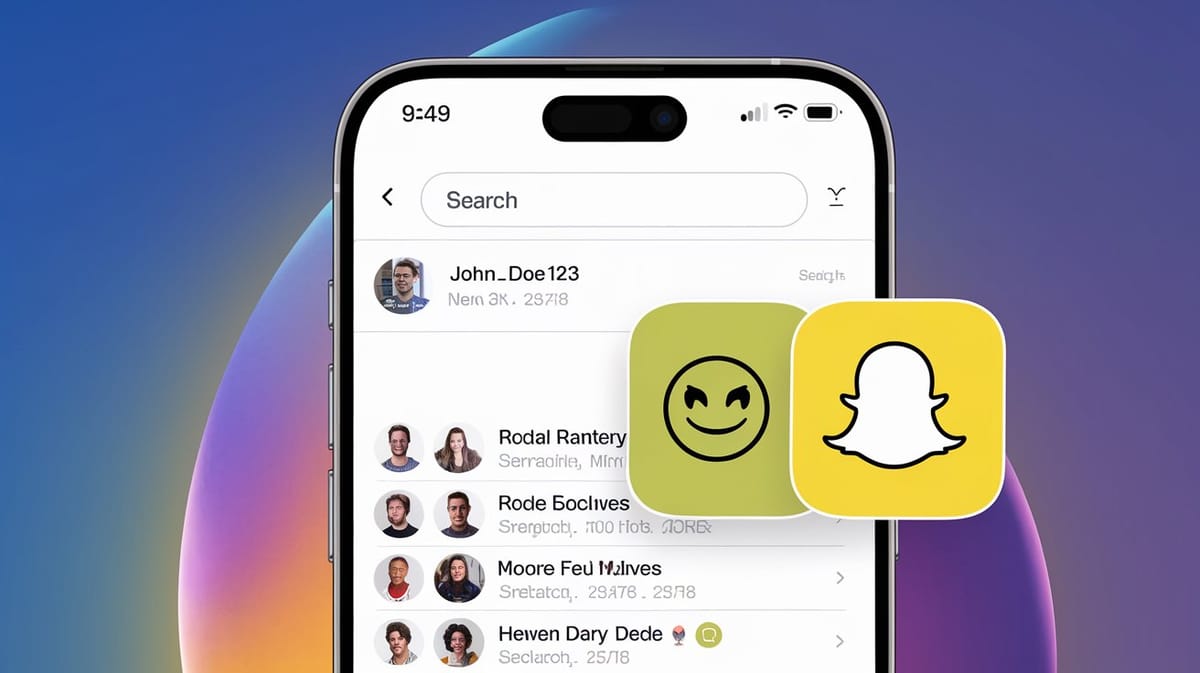Snapchat Email Finder Tools and Methods: How to Find Someone’s Email on Snapchat

In the digital age, where social media platforms like Snapchat have become integral to personal and professional communication, the quest for privacy and data security is more critical than ever. Snapchat, known for its ephemeral messaging and multimedia sharing capabilities, has garnered a massive user base, making it a focal point for both social interactions and privacy concerns. As users increasingly seek to connect with others beyond the platform, the demand for tools and methods to discover additional contact information, such as email addresses, has surged.
This report delves into the various tools and methods employed to find someone's email on Snapchat, examining the ethical, legal, and privacy implications associated with these practices. It is essential to understand that while some tools claim to offer legitimate ways to uncover email addresses, they often operate in a gray area of legality and ethics. The report will explore the technical mechanisms behind these tools, assess their reliability, and discuss the potential risks involved in using them.
You can also visit Oncely.com to find more Top Trending AI Tools. Oncely partners with software developers and companies to present exclusive deals on their products. One unique aspect of Oncely is its “Lifetime Access” feature, where customers can purchase a product once and gain ongoing access to it without any recurring fees. Oncely also provides a 60-day money-back guarantee on most purchases, allowing customers to try out the products and services risk-free.
Oncely are hunting for the most fantastic AI & Software lifetime deals like the ones below or their alternatives:

Table of Contents
- Understanding Snapchat's Privacy Policies
- Data Collection and Usage
- Data Retention and Deletion
- User Control and Privacy Settings
- Sharing and Third-Party Access
- Ethical Considerations and Privacy Violations
- Methods for Finding an Email on Snapchat
- Checking Snapchat Profiles for Publicly Shared Information
- Utilizing People Search Engines
- Direct Communication and Request
- Investigating Email Inboxes and Password Managers
- Ethical and Privacy Considerations
- Legal and Ethical Considerations
- Privacy and Data Protection Laws
- Ethical Implications of Email Finder Tools
- Potential for Misuse and Harassment
- Compliance with Platform Policies
- Balancing Privacy with Legitimate Interests
Understanding Snapchat's Privacy Policies
Data Collection and Usage
Snapchat, a platform known for its ephemeral messaging, collects a variety of user data to enhance its services. According to Snap Inc.'s Privacy Policy, the company gathers information such as your birthday, email address, and username when you set up an account. Additionally, Snapchat learns from your interactions with the app, such as the content you view and the features you use, to personalize your experience. This includes tailoring advertisements and content to your preferences, which is a common practice among social media platforms to increase user engagement.
Snapchat's data collection extends beyond basic account information. The platform also collects location data, despite previous claims to the contrary. The Federal Trade Commission (FTC) found that Snapchat transmitted WiFi-based and cell-based location information from Android users to its analytics tracking service provider. This revelation highlights the importance of scrutinizing privacy policies and understanding the extent of data collection practices.
Data Retention and Deletion
Snapchat's approach to data retention is designed to align with its core feature of ephemeral messaging. As detailed in their Privacy Center, most messages, such as Snaps and Chats, are automatically deleted from Snapchat's servers after being viewed or expiring. However, some information is retained for longer periods. For instance, basic account information like your name, phone number, and email address is stored until you request its deletion.
The platform also retains data related to user preferences and interactions to improve content recommendations and advertising. This ongoing data collection underscores the need for users to be proactive in managing their privacy settings and understanding the implications of data retention policies.
User Control and Privacy Settings
Snapchat provides users with several tools to manage their privacy settings and control the information they share. Users can update their account information, adjust who can view their Stories, and manage their presence on the Snap Map through the app's settings. Additionally, Snapchat allows users to download their data, offering transparency into the information collected by the platform.
The platform also offers options to revoke permissions and delete certain types of data. For example, users can opt out of promotional emails and SMS by using the unsubscribe link provided. Snapchat's Privacy Policy emphasizes the importance of user control, allowing individuals to modify their advertising preferences and manage the data used for targeted ads.
Sharing and Third-Party Access
Snapchat's privacy policies outline the circumstances under which user data may be shared with third parties. When users connect their Snapchat account to a third-party app, the platform may share information as directed by the user. Additionally, content shared on Snapchat can be distributed based on personal settings and the type of service used. For instance, a Snap sent to a single friend is more private than content shared on My Story, which can be viewed by a broader audience.
The platform also shares public information, such as usernames and profile pictures, with all Snapchatters, business partners, and the general public. This level of data sharing highlights the importance of understanding privacy settings and the potential reach of shared content.
Ethical Considerations and Privacy Violations
Snapchat's history includes several privacy violations that have raised ethical concerns. The FTC found that Snapchat collected contact information from users' address books without notice or consent, violating user privacy. Additionally, the platform's "Find Friends" feature was criticized for not verifying phone numbers during registration, leading to potential miscommunication and privacy breaches.
These incidents underscore the ethical responsibility of digital platforms to protect user data and maintain transparency in their privacy practices. Users must remain vigilant and informed about the privacy policies of the platforms they use, ensuring that their personal information is safeguarded against unauthorized access and misuse.
In conclusion, understanding Snapchat's privacy policies is crucial for users who wish to protect their personal information while using the platform. By familiarizing themselves with data collection practices, retention policies, and user control options, individuals can make informed decisions about their privacy settings and the information they choose to share.
Methods for Finding an Email on Snapchat
Checking Snapchat Profiles for Publicly Shared Information
One of the primary methods to find an email associated with a Snapchat account is to check the user's profile for any publicly shared contact information. Many businesses, influencers, and creators on Snapchat often include their email addresses in their bios or provide a "Contact" button that may link to their email or other social media profiles. This method relies on the user's willingness to share their contact details openly on their profile. However, for regular personal users, this information might not be available, necessitating further investigation (Super Easy).
Utilizing People Search Engines
Specialized people search engines, such as BeenVerified, can be employed to find email addresses associated with a Snapchat user. These tools do not directly reveal Snapchat-associated emails but instead crawl through vast amounts of online data and public records to match a virtual username with a real identity. By entering the Snapchat username or the person's full name and state, users can receive a detailed report that may include potential email addresses, phone numbers, and other personal details. It is important to note that accessing the full report typically requires a paid membership (Super Easy).
Direct Communication and Request
If the above methods do not yield results, directly asking the person for their email address can be an effective approach. This method involves reaching out to the individual through Snapchat or other communication channels and politely requesting their email address, explaining the reason for the request, whether for business or personal purposes. If the initial request does not receive a response, a courteous follow-up message may be necessary. This approach respects the individual's privacy and provides an opportunity for them to share their contact information willingly (Super Easy).
Investigating Email Inboxes and Password Managers
For users attempting to recover their own Snapchat account, checking their email inboxes for confirmation emails from Snapchat can help identify the linked email address. When an email is added to a Snapchat account, a confirmation email is typically sent to that address. Users can search through their email accounts for any messages from Snapchat to determine which email is associated with their account. Additionally, checking password managers for stored Snapchat credentials may reveal the linked email address (Super Easy).
Ethical and Privacy Considerations
While these methods can be useful for finding an email associated with a Snapchat account, it is crucial to consider the ethical and privacy implications. Snapchat's privacy policies are designed to protect user information, and any attempt to access private data without consent may violate these policies. Users should be aware that tracing someone's IP address or real-time location on Snapchat is impossible and prohibited by the platform. Any tool claiming to offer such capabilities is likely a scam. It is essential to respect user privacy and adhere to ethical standards when attempting to find contact information (Super Easy).
In summary, while there are several methods to find an email associated with a Snapchat account, each comes with its own limitations and ethical considerations. Users should prioritize methods that respect privacy and seek consent whenever possible.
Legal and Ethical Considerations
Privacy and Data Protection Laws
The use of Snapchat email finder tools raises significant legal and ethical concerns, particularly in relation to privacy and data protection laws. Snapchat, like many social media platforms, is governed by various privacy regulations that aim to protect user data. For instance, the General Data Protection Regulation (GDPR) in the European Union mandates that personal data, such as email addresses, must be processed lawfully, fairly, and transparently. This regulation requires explicit consent from users before their data can be shared or used for purposes other than those initially intended (European Commission).
In the United States, the California Consumer Privacy Act (CCPA) provides similar protections, granting consumers the right to know what personal data is being collected and the ability to opt-out of its sale (California Legislative Information). The use of tools that attempt to extract email addresses from Snapchat profiles without user consent could potentially violate these laws, leading to legal repercussions for both the developers of such tools and their users.
Ethical Implications of Email Finder Tools
The ethical implications of using Snapchat email finder tools are profound. These tools often operate by aggregating publicly available data from various online sources, which may include social media profiles, public records, and other digital footprints. While this data is technically accessible, the ethical question arises as to whether it is appropriate to compile and use this information without the explicit consent of the individuals involved.
The principle of informed consent is a cornerstone of ethical data use. Users may not be aware that their publicly shared information could be aggregated and used to deduce their email addresses. This lack of awareness can lead to a breach of trust and privacy, as individuals may not have intended for their information to be used in this manner. Ethical considerations demand that users of such tools respect the privacy and autonomy of individuals by seeking consent before using their data.
Potential for Misuse and Harassment
The potential for misuse of Snapchat email finder tools is a significant concern. These tools can be exploited for malicious purposes, such as stalking, harassment, or phishing attacks. By obtaining an individual's email address without their knowledge, malicious actors can engage in targeted harassment or send unsolicited communications, which can lead to emotional distress and privacy violations.
Moreover, the use of these tools can facilitate phishing attacks, where attackers impersonate legitimate entities to trick individuals into revealing sensitive information. This not only poses a risk to the individual whose email address has been obtained but also to the broader community, as phishing attacks can lead to data breaches and financial losses (Federal Trade Commission).
Compliance with Platform Policies
Snapchat's terms of service and privacy policies explicitly prohibit the unauthorized collection and use of user data. According to Snapchat's policies, users are not allowed to access or collect data from the platform using automated means without Snapchat's express permission (Snapchat Terms of Service). The use of email finder tools that scrape data from Snapchat profiles may therefore be in direct violation of these terms, leading to potential account suspension or legal action from Snapchat.
Compliance with platform policies is crucial for maintaining the integrity and trust of social media ecosystems. Users and developers must ensure that their actions align with the terms set forth by the platform to avoid legal consequences and to uphold ethical standards.
Balancing Privacy with Legitimate Interests
While the privacy concerns associated with Snapchat email finder tools are significant, there are scenarios where the use of such tools may be justified. For instance, businesses and marketers may seek to connect with potential clients or collaborators who have publicly shared their contact information for networking purposes. In such cases, the use of email finder tools can be seen as a legitimate interest, provided that the data is used responsibly and in compliance with privacy laws.
To balance privacy with legitimate interests, users of email finder tools should adhere to best practices, such as obtaining consent, providing transparency about data usage, and ensuring data security. By doing so, they can mitigate the ethical and legal risks associated with these tools while still achieving their objectives.
In conclusion, the use of Snapchat email finder tools presents a complex interplay of legal and ethical considerations. Users and developers must navigate these challenges carefully, ensuring compliance with privacy laws and platform policies while respecting the privacy and autonomy of individuals. By prioritizing ethical data use and transparency, the potential harms associated with these tools can be minimized, fostering a more responsible and respectful digital environment.





